You Will Hear Thunder Anna Akhmatova Also translated by D.M. Thomas Alexander Pushkin: The Bronze Horseman
(Selected Poems) You Will Hear Thunder Akhmatova : Poems Translated by D.M. Thomas  Ohio University Press
Ohio University Press
Athens Swallow Press An imprint of Ohio University Press, Athens, Ohio 45701 www.ohioswallow.com All rights reserved To obtain permission to quote, reprint, or otherwise reproduce or distribute material from Ohio University Press publications, please contact our rights and permissions department at (740) 593-1154 or (740) 593-4536 (fax). Printed in the United States of America Swallow Press/Ohio University Press books are printed on acid-free paper  Requiem and Poem without a Hero first published in England 1976 by Elek Books Limited, London Way of all the Earth first published in England 1979 by Martin Secker & Warburg Limited This edition first published in England 1985 by Martin Secker & Warburg Limited Published in the United States of America 1985 by Ohio University Press, Athens, Ohio Translation copyright D. M. Thomas, 1976, 1979, 1985 ISBN 978-0-8040-1191-4 pbk Library of Congress Catalog Card Number 84-062245 Acknowledgements In the spirit of an apprentice painter joining a masters workshop, I have had three spells of translating Akhmatova: in 1964 (Requiem), 1974 (Poem without a Hero), and 1977 (a selection of mostly shorter poems).
Requiem and Poem without a Hero first published in England 1976 by Elek Books Limited, London Way of all the Earth first published in England 1979 by Martin Secker & Warburg Limited This edition first published in England 1985 by Martin Secker & Warburg Limited Published in the United States of America 1985 by Ohio University Press, Athens, Ohio Translation copyright D. M. Thomas, 1976, 1979, 1985 ISBN 978-0-8040-1191-4 pbk Library of Congress Catalog Card Number 84-062245 Acknowledgements In the spirit of an apprentice painter joining a masters workshop, I have had three spells of translating Akhmatova: in 1964 (Requiem), 1974 (Poem without a Hero), and 1977 (a selection of mostly shorter poems).
The first two works were published together as Requiem & Poem without a Hero (Elek. London, and Ohio U.P., 1976); the third body of translations was published under the title Way of All the Earth (Secker & Warburg Ltd., London, and Ohio U.P., 1979). The first of these volumes has long been out of print in Britain, and I am grateful to my publishers for providing an opportunity, in the present book, of bringing all my translations of Akhmatova together. Akhmatova once referred to the blessedness of repetition. At the risk of some clumsiness of repetition (particularly in the Introductions) I have decided to leave the 1976 and 1979 texts essentially as they were. P. P.
Struve and B. A. Fillipov. I am grateful also to Professor Struve for helpful advice in correspondence. My introduction and notes to Poem without a Hero draw heavily on their scholarship, and also on the late Max Haywards excellent introduction and notes in Poems of Akhmatova, selected and translated by Stanley Kunitz with Max Hayward (Collins-Harvill, 1974). Amanda Haights biography (Akhmatova, A Poetic Pilgrimage, Oxford U.P., 1976) was invaluable in supplying background information and interpretative comment.
To her own translations and to those of Richard McKane and Stanley Kunitz, I am indebted for the occasions when a phrase or a line, in one or other of them, struck me as so happy that it would have been foolish to try to find a better. I am grateful to Jennifer Munro for her patient help with texts I found difficult to understand. Michael Glenny and Vera Dixon also gave me much-appreciated help. But the errors, both linguistic and aesthetic, are mine; and the successesAkhmatovas. D.M.T. 1984 Introduction Akhmatova hated the word poetess.
If we call her by that name, it is in no condescending sense but from a conviction shared by many critics and readers that her womanliness is an essential element of her poetic genius, a something added, not taken away. Gilbert Frank has pointed to her unusual blending of classical severity and concreteness with lyrical saturation; Andrei Sinyavsky, to the range of her voice from the barest whisper to fiery eloquence, from downcast eyes to lightning and thunderbolts. No insult is intended, therefore, in saying that Akhmatova is probably the greatest poetess in the history of Western culture. She was born in 1889, in Odessa on the Black Sea coast, but her parents soon moved to Petersburg. All her early life was spent at Tsarskoye Selo, the imperial summer residence; her poetry is steeped in its memories, and in Pushkin, who attended school there. In 1910 she married the poet Nikolai Gumilev, and her own first collection, Evening, appeared in 1912.
She and her husband became a part of that rich flowering of creative talentthe names Blok, Stravinsky, Diaghilev, Mendelstam Prokofiev, Meyerhold merely begin the listwhich made it the Silver Age: though it might better be described as the second Golden Age. Akhmatova, Mandelstam and Gumilev became the leaders of Acmeism, a poetic movement which preferred the virtues of classicism, firmness, structure, to the apocalyptic haze and ideological preoccupations of Blok and the other Symbolists. Gumilev was shot by the Bolsheviks in 1921 as an alleged counter-revolutionary. Despite the fact that Akhmatova and he had been divorced for three years, the taint of having been associated with him never left her. To borrow Pasternaks metaphor (from Doctor Zhivago), had reached the corner of Silver Street and Silent Street: practically none of her poetry was published between 1923 and 1940. At the beginning of the Stalinist Terror, her son, Lev Gumilev, was arrestedreleasedrearrested, and sent to the labour camps.
Nikolai Punin, an art critic and historian, with whom she had been living for ten years, was also arrested, though he was released a year or two later: the first lyric of Requiem is said to refer to his arrest. Her son was released early in the war to fight on the front-line; but he was again arrested and transported to Siberia in 1949. He was finally freed only in 1956, after Stalins death and partial denunciation. For Akhmatova herself, life was relatively happier during the war, when the enemy was known and could be fought. Such happiness, as she said, was a comment on the times! She endured the first terrible months of the Leningrad siege, and was then evacuated, with other artists, to Tashkent. Some of her poems were published, and in 1945 a collected works was said to be forthcoming.
It never appeared. In the renewed repression a violent campaign of abuse was directed at her. She was too personal, too mystical. Zhdanov, Stalins cultural hack, described her as a nun and a whore. This would appear to be a marvellous mixture of archetypes for a poet, but of course his remarks were neither meant, nor taken, in that way. She was expelled from the Writers Uniontantamount to her abolitionand was henceforth followed everywhere by two secret police agents.
The thaw following Stalins death led to a cautious rehabilitation. Some of Akhmatovas poetry was published again, though (and this is still the case) never Requiem, except in isolated fragments. Poem without a Hero, also, has never been published complete in the Soviet Union. Granted permission to visit the West, she received the honorary degree of D.Litt. at Oxford in 1965, and revisited old friends in London and Paris. What was much more important to her than official tolerance, she had become deeply loved and revered by her countrymen.
To them, she was the conscience of Russia; she had not fled to safety as others had done after the Revolution; she had chosen to stay and endure, and to bear witness. She died in 1966. Five thousand people, mostly the young, crowded to her requiem mass in a Leningrad church. Requiem needs little introduction; it speaks for itself. It belongs to a select number of sacred texts which, like American Indian dream-poems but for more sinister reasons, were considered too momentous, too truthful, to write down. From 193540, the period of its composition, to 1957, it is said to have survived only in the memories of the poet and a few of her most trusted friends.
Next page
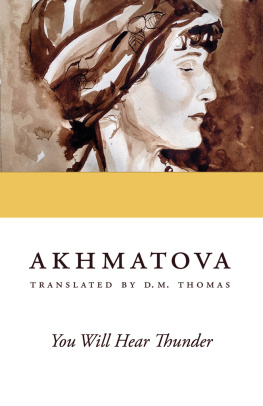

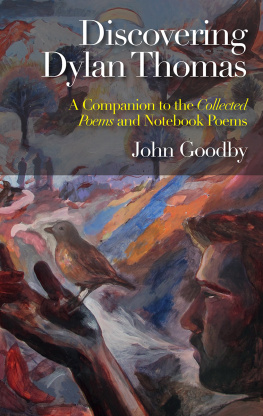
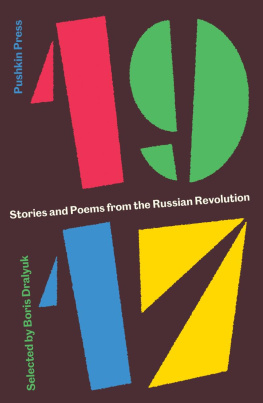
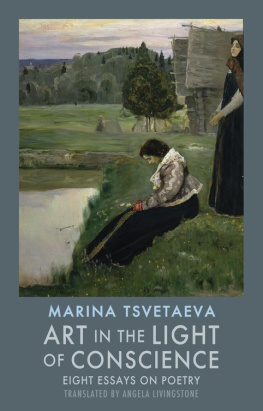
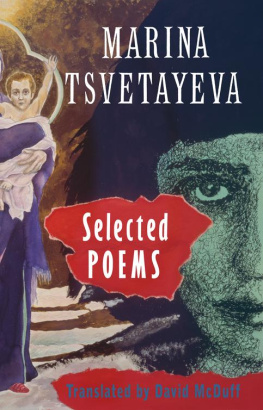
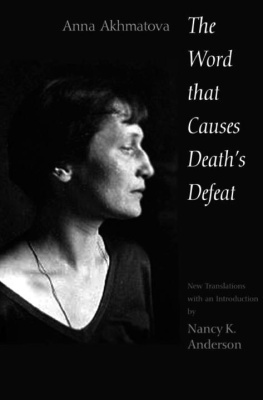
 Ohio University Press
Ohio University Press Requiem and Poem without a Hero first published in England 1976 by Elek Books Limited, London Way of all the Earth first published in England 1979 by Martin Secker & Warburg Limited This edition first published in England 1985 by Martin Secker & Warburg Limited Published in the United States of America 1985 by Ohio University Press, Athens, Ohio Translation copyright D. M. Thomas, 1976, 1979, 1985 ISBN 978-0-8040-1191-4 pbk Library of Congress Catalog Card Number 84-062245 Acknowledgements In the spirit of an apprentice painter joining a masters workshop, I have had three spells of translating Akhmatova: in 1964 (Requiem), 1974 (Poem without a Hero), and 1977 (a selection of mostly shorter poems).
Requiem and Poem without a Hero first published in England 1976 by Elek Books Limited, London Way of all the Earth first published in England 1979 by Martin Secker & Warburg Limited This edition first published in England 1985 by Martin Secker & Warburg Limited Published in the United States of America 1985 by Ohio University Press, Athens, Ohio Translation copyright D. M. Thomas, 1976, 1979, 1985 ISBN 978-0-8040-1191-4 pbk Library of Congress Catalog Card Number 84-062245 Acknowledgements In the spirit of an apprentice painter joining a masters workshop, I have had three spells of translating Akhmatova: in 1964 (Requiem), 1974 (Poem without a Hero), and 1977 (a selection of mostly shorter poems).